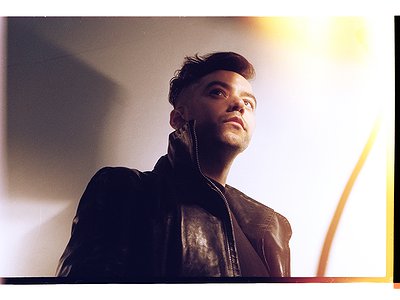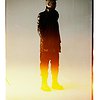Name: Blush Response / Joey Gonzalez
Nationality: Cuban-American
Occupation: Producer
Current Release: Infinite Density on Sonic Groove
Recommendations: 1. Music - Morton Subotnick - The Wild Bull. If you want to hear the master at work. Creating and deconstructing everything in 1968. None of us would be here without this. Music is just now again returning to this freeform approach.
2. Book - Neal Stephenson - The Diamond Age - A vision of a future that I see becoming more true as resource scarcity becomes the major issue in our lives and we find a solution to move beyond that. The fight between corporate power trying to dominate access to basic resources and the will of the people to find open source solutions will be the next thing humanity needs to solve.
Website / Contact: Check the Blush Response homepage or his facebook profile for more information, including new releases and tour dates.
When did you start writing/producing music - and what or who were your early passions and influences? What what is about music and/or sound that drew you to it?
I started writing music when I was 16 in my parents' basement. We had just moved to upstate New York and I got my first synth, a Korg Microkorg. Early on I was really into 80s synth pop and new wave stuff - Depeche Mode, Japan, Gary Numan, John Foxx. From that I moved on to industrial, IDM, breakcore, really anything electronic I could listen to. My first tracks ever were pretty in line with this - mixing all influences to try and find my own sound. I always knew I wanted to create something new, but didn’t know how to get there.
My first introduction to electronic music was a rave compilation I got from my aunt - Priority Records Best of Rave 1993. It had tracks from LFO, The Art of Noise (remixed by The Prodigy!), Psykosonik, and other stuff that fit the rave description. I still listen to some of the tracks from that pretty often. I don’t know what drew me to it. I just really loved the way synthesizers sound. I can listen to them all day and night. Often at home, I will listen to youtube synthesizer demos as much as I do regular music. That is a genre all on its own.
For most artists, originality is first preceded by a phase of learning and, often, emulating others. What was this like for you? How would you describe your own development as an artist and the transition towards your own voice? What is the the relationship between copying, learning and your own creativity?
From the very beginning I knew I always wanted to find my own sound, so making music for me was a journey to find things that I found fresh for myself. So I never set out to emulate anyone, though I’m sure you can find traces of my influences everywhere. To shed this, I try to be as productive as possible. I am always writing and trying out new things. Early on I made music with vocals and song structures because I thought that’s what would be viable for a career - a bit of a silly thought in retrospect because I listen to more instrumental music than vocal music anyway. Later as I became more comfortable expressing myself, I realized I didn’t like doing that, and wanted to speak only through the synthesizers - I didn’t like having to cut up my pure sound expressions into a pop song structure.
What were your main compositional- and production-challenges in the beginning and how have they changed over time?
The hardest part was finishing anything at the start - this was due in part to my insistence on writing vocal parts. Without that now it’s much easier to do things. My output has definitely increased exponentially. The biggest challenge lately is improving my sound and finding new ways to excite my ears. I am always striving for the absolute best sounding mixes and the highest quality possible. With that I also want to forge new paths within sound, creating something wholly my own. It’s really a constant learning experience - every day I learn something new.
What was your first studio like? How and for what reasons has your set-up evolved over the years and what are currently some of the most important pieces of gear for you?
My first proper setup was out of my college dorm room. I had an Access Virus TI, Waldorf Microwave XTk, Waldorf Pulse, Korg MS20, and Dave Smith Evolver. I did my first releases with this setup - a lot of synths had come into my life before then - juno 106, microkorg, nord lead 2x, to name a few, but those 5 were the constant ones. At the time I wanted the most and varied synth power. I always try to make sure there is no overlap in functionality between my various pieces. Nowadays my setup consists of a giant eurorack modular (8 rows @104 hp, ever growing and changing), Waldorf Micro Q Keyboard, Kawai K5000s, Elektron Octatrack, Analog RYTM, and Digitakt, and a revolving door of other little things that come in and out. All of this recorded into Ableton Live, though lately I’ve been experimenting with Bitwig Studio as well. I really like Bitwig’s built in modulation capabilities.
[Read our feature on the Juno 106]
The most important piece of gear at the moment is of course my modular - featuring stuff from Make Noise, Industrial Music Electronics, Schippmann, Cwejman, Erica Synths, Doepfer, Intellijel, Mutable Instruments, and many other manufacturers. It is the centerpiece of my setup and what makes 90% of my sounds. I love modular because it allows you to design a dream instrument that fits every musical need you could have. I have built mine to be equal parts a sound design tool, singular instrument/groovebox, and sound processing tool. I like when I make huge patches on it that are basically an entire track with every part playing and breathing like a living mechanical creature, all in the control of my hands.
How do you make use of technology? In terms of the feedback mechanism between technology and creativity, what do humans excel at, what do machines excel at?
In terms of what humans excel at - I can only speak for myself. I find that technology is the entire reason I explore sound, and what I personally excel at is pushing myself to explore this sound and capture these explorations on recording. Machines, at least my machines, excel at being commanded to do my bidding as curator and conductor of sound.
I like to think that each track is a snapshot of my brain in the moment I made it, and the feedback loop between what is in my mind, and what comes out feed off of each other. Oftentimes a track comes out different than I have envisioned, but by letting the instruments guide me with their voice, I end up in a new place that better captures my own voice as well as the guidance dictated by the machine god.
Production tools, from instruments to complex software environments, contribute to the compositional process. How does this manifest itself in your work? Can you describe the co-authorship between yourself and your tools?
I definitely enjoy moments when the synth acts unpredictable or goes a place I don’t expect it to. Oftentimes the coolest sounds come from this - at the same time I have principles about instrumental performance that make me always want to be the one dictating the motion. I try to take a very hands on approach to what I do. I always have Ableton recording so nothing is missed if a crazy sound pops up. I have my computer set up so that I can’t actually hear anything coming out of my gear unless Ableton is open.
Music technology is constantly evolving at a rapid pace, and with this rapid evolution people can get lost always trying the newest and coolest thing. I try my best to focus on the tools I have, mastering them first. Knowing your equipment always brings better results than trying a bunch of new things you don’t know.
Collaborations can take on many forms. What role do they play in your approach and what are your preferred ways of engaging with other creatives through, for example, file sharing, jamming or just talking about ideas?
All of my collaborations to date have been in the same room with another person. I really prefer this approach because you can directly feed off of each other’s energy and work faster. I have worked remotely a few times when doing sound design for other people’s records, and although that makes time unlimited, I really prefer being in the room. It’s just cooler, and if I’m collaborating with someone, it’s generally because we get along as friends, so it always is a nice hangout as well. Most of my collaborations happen because I like the person I am doing it with. If we get on well, I am generally down for a jam. You never know what could come out!



